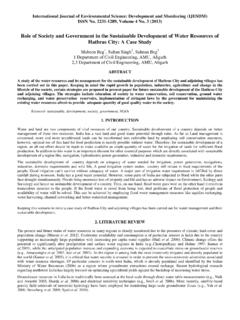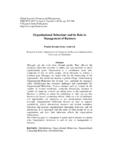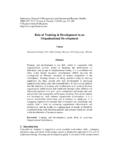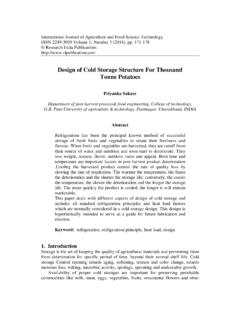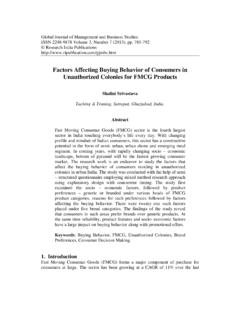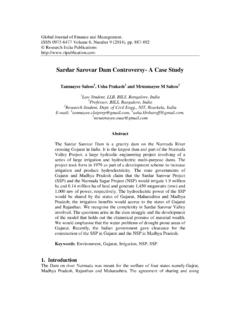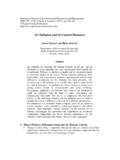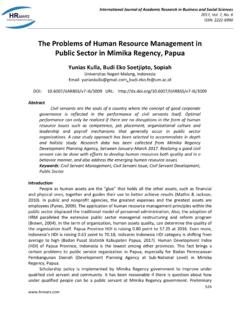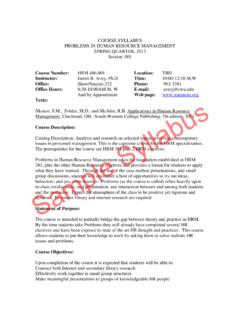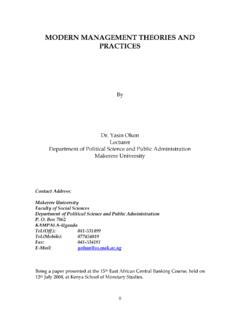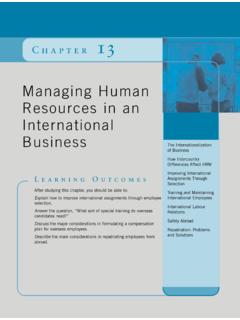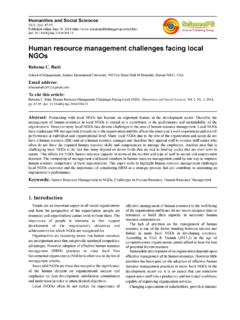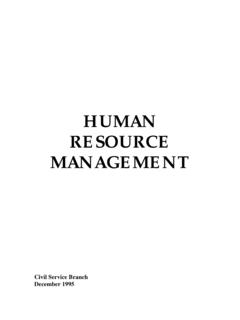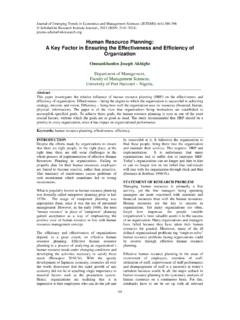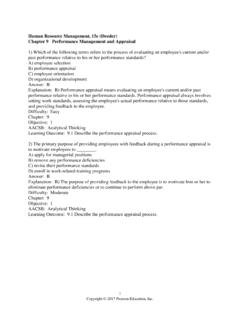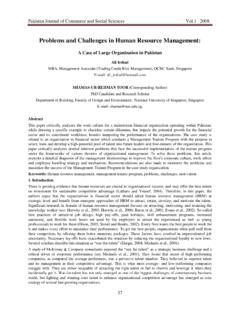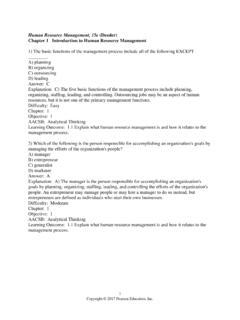Transcription of Managing Human Resources in International …
1 Global Journal of management and Business Studies. ISSN 2248-9878 Volume 3, Number 4 (2013), pp. 355-360 Research India Publications Managing Human Resources in International Organizations Neha Tiwari Department of Humanities, Babu Banarsi Das Northern India Institute of Technology (Bbdniit), Lucknow Uttar Pradesh. B-15/39 Shivaji Puram Sector 14 Indira Nagar, Lucknow 226016. Abstract In the era of globalization business organizations do not confine themselves in one country .In order to explore new markets and opportunities, organizations expand their International operations. In Managing subsidiaries across different countries, the approach to marketing, finance, operations, production and above all Human resource management functions has to be tailored according to the local environment where the subsidiary has to operate.
2 Organizations are not strategy, structures or systems rather they are about people. In order to survive and grow in International markets organizations adapt their HRM practices for successful execution of strategies. International Human resource management is defined as the Human resource management issues and problems arising from internationalization of business, and the Human resource management strategies, policies and practices which firm pursue in response to the internationalization of business (Scullion 1995). The field of International Human resource management has been a focus of all business organizations and its importance will grow in the years to come. Multinational Companies (MNC S) use three types of strategies for transfer of HR practices across different nations; Ethnocentric strategy uses same HR practices of parent company in host nations, Polycentric strategy employ local people as workforce and adapts the HR practices of host nation, Geocentric strategy only focuses on skills of the employee and adopts HR practices which are most effective and efficient irrespective of the nationality.
3 All strategies have their pros and cons, they are applied as per the type of business, the strategy of the organization, the leadership, and the past experiences of the organization regarding different strategies. The International organizations can use culturally sensitive and adaptive HRM practices for creating competitive advantage in overseas operations. In attempt to explore new markets and opportunities multinational companies are adapting to HRM practices across different borders. Neha Tiwari 356 KEYWORDS: Globalization, subsidiary, HRM practices, Polycentric, Ethnocentric, Geocentric. 1. Introduction Business organizations continuously expand their International operations for sustainable growth and profitability. To improve their competitive positions globally; companies seek to work upon different sources of competitive advantage.
4 Contemporary organizations have realized that sustained competitive advantage arises more from a firm s internal resource endowments and resource deployments that are imperfectly imitable than from the firm s product market position (Lado & Wilson, 1999).And so the business organizations now consider Human resource system to be a source of competitive advantage. A multinational corporation (MNC) is defined as an enterprise that operates in several countries but is managed from one home country or when it derives more than one quarter of its revenue outside the home country. The type of strategy pursued by an organization decides the Human resource management (HRM) practices. MNCs may adopt International strategy where existing core competencies are used to exploit opportunities in foreign markets, a Multidomestic strategy where foreign subsidiaries operate as autonomous units to customize products and services as per local needs, a Global strategy focus on tight control on global operations to maintain standardization, and Transnational strategy combines policies regarding staffing, expatriate selection, compensation, industrial relations, training, and diversity management .
5 2. Staffing Policies in MNC S Staffing policies in International HRM defines the process through which the MNC assigns the foreign job to the most appropriate candidate. There are three approaches to staffing in MNC s. Polycentric approach to International management is the policy involved in hiring and promoting employees who are citizens of the host country. The polycentric approach involves low costs of recruiting and training with lesser problems of adjustment and communication since all employees are from the same region. Ethnocentric approach is used in MNC s having International strategic orientation while polycentric approach maintains employees from the same area, ethnocentric involves sending employees from the home or parent countries to the host country.
6 Geocentric staffing approach is adopted when companies implement a transnational orientation. In such an approach people are recruited based on their skills and experiences irrespective of their nationality. Managing Human Resources in International Organizations 357 Source: Charles Hill, Ninth Edition. (2013), International Business. Figure I: Comparison of staffing approaches. 3. Selection and Training of Expatriates Expatriate is the employee who relocates with or without family for a for a foreign country for completion of job .Selecting the right person is important else there may be problem of premature return of the expatriate and complications in International business operations.. Ronen (1989) describes five categories of attributes of success: (1) job factors (2) relational dimensions, (3) motivational state (4) family situation, and (5) language skills.
7 These five selection criteria are found to be effective in deciding on the suitability of an expatriate for a foreign assignment. Training of expatriates and employees involved in International business is a decisive factor deciding the quality and performance of HR in International business. The training should include. Cross Cultural training it should foster an understanding and appreciation of host country s culture. Language training the training must provide the knowledge of the language used to communicate in the host country the rules of verbal, written, oral and non verbal communication prevalent in host country must be introduced. Job specific/technical training every job assignment is unique and the employee must be trained to deal with the specific requirements of the job.
8 Mendenhall et al. (1987) distinguish between three types of training, namely, (1) information giving approaches, which have a relatively low level of rigour; (2) affective approaches which address people s feelings as well as facts ; and Neha Tiwari 358(3) immersion approaches which are in-depth methods covering a broad range of topics and methods. Source: Mendenhall, Dunbar & Oddou, 1987: Figure II 4. Issues in Compensation in International HRM The right type of compensation is even more important for employee motivation in International HRM because the risks and challenges in performing are higher. Mostly the MNC s rely on balance sheet approach in deciding pay and benefits .It can be implemented by home based method, headquarter based method or host based method.
9 The companies must compensate for cost of living in the host country, Foreign Service Managing Human Resources in International Organizations 359 premium, healthcare costs, educational allowance for children and housing assistance in host country. The company must consider the burden of dual taxation and other taxes like excise customs. 5. Repatriation management When expatriates return to home country they may experience reverse culture shock , which may lead to dissonance at work and family. The companies must have a repatriation adjustment program; the company may provide counseling to employees to deal with the sudden changes. The companies must utilize the knowledge and experience of the repatriate, the career progression of the employee; away for the foreign assignment; must be decided in advance to avoid career stagnation upon returning.
10 6. Conclusion Managing Human Resources in International organizations can be a complex issue. MNC s continuously strive to improve their International HRM strategies .Selection of the right incumbent for the foreign assignment must be based on holistic selection criteria, especially the criteria of cultural adaptability. Training before assigning the job is must to make the employee aware of the challenges ahead, Managing repatriation through a career progression plan for expatriate and employee counseling is another focus area of International HRM. The correct compensation strategy keeps the employee morale high and motivates others in the organization to accept foreign assignments. The MNC s must strive to maintain harmonious labor relations to avoid confrontations with labor and trade unions in host country.
